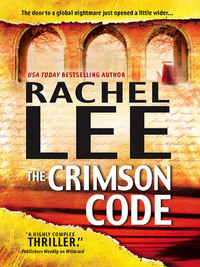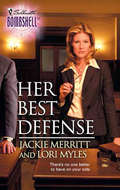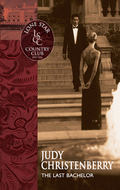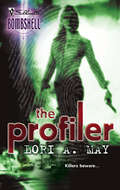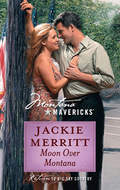Kitab fayl olaraq yüklənə bilməz, yalnız mobil tətbiq və ya onlayn olaraq veb saytımızda oxuna bilər.
Kitabı oxu: «The Crimson Code»
Praise for RACHEL LEE
“A highly complex thriller…deft use of dialogue…”
—Publishers Weekly on Wildcard
“Rachel Lee deserves much acclaim for her exciting tales of romantic suspense.”
—Midwest Book Review
“The Crimson Code is a smart, complex thriller with enough twists to knot your stomach and keep your fingers turning the pages.”
—New York Times bestselling author Alex Kava
“A suspenseful, edge-of-the-seat read.”
—Publishers Weekly on Caught
“With its smartly paced dialogue and seamless interweaving of both canine and human viewpoints, this well-rounded story is sure to be one of Lee’s top-selling titles.”
—Publishers Weekly on Something Deadly
“Rachel Lee is a master of romantic suspense.”
—Romantic Times BOOKclub
The Crimson Code
Rachel Lee

To Leslie Wainger, who has always believed in us and who has helped us grow.
Contents
Prologue
Chapter 1
Chapter 2
Chapter 3
Chapter 4
Chapter 5
Chapter 6
Chapter 7
Chapter 8
Chapter 9
Chapter 10
Chapter 11
Chapter 12
Chapter 13
Chapter 14
Chapter 15
Chapter 16
Chapter 17
Chapter 18
Chapter 19
Chapter 20
Chapter 21
Chapter 22
Chapter 23
Chapter 24
Chapter 25
Chapter 26
Chapter 27
Chapter 28
Chapter 29
Chapter 30
Chapter 31
Chapter 32
Chapter 33
Chapter 34
Chapter 35
Epilogue
Prologue
Jakarta, Indonesia
Arief Sarwano looked at his children sitting in the pew beside him and smiled. Christmas had been kind to his family this year. The electronics firm that employed him had done well, churning out over two hundred thousand units of CyberJoey, the animatronic baby kangaroo that was the year’s top-selling Christmas gift in Australia. It had been Arief’s project, and he had done much of the design work himself. At that moment, tens of thousands of Australian children were clapping their hands in glee as the plush robot hopped around their Christmas trees and thumped its tail on their floors.
Others might think it absurd that he had poured two years of his life into three pounds of plastic, nylon, silicon and metal that modeled one of the earth’s most recognizable animals in a way calculated to attract the attention of five-to nine-year-old children, not to mention the shopping dollars of those children’s parents. But as Arief saw it, making children smile was a noble vocation.
And, when a project hit big, a profitable one. The success of CyberJoey had meant, not only a promotion and a raise, but also a healthy bonus. That bonus would ensure that his daughter could realize her dream of going to the United States to attend Notre Dame University next fall. She wanted to study medicine, in America, at the Catholic university. Not a Catholic university. The Catholic university, the best in America. He chuckled at the memory of the many times she had chided him on that point.
He looked up at the choir and found her in the alto section, slender and beautiful, her long dark hair falling around a face that each day reminded him more and more of her mother. For an instant, he felt the pang again.
The loss of his wife of twenty years, a victim of cancer, had blighted the past two Christmases. Arief had dealt with that loss by pouring himself into his work. In the past months, however, he had come to think that his wife’s spirit inhabited every CyberJoey. The toy’s eyes had been modeled on hers. And if just one Australian child looked into those eyes and saw love, then Arief’s wife was still alive in that child’s heart.
The Jalan Cathedral was packed, which was no surprise. The noonday Mass on Christmas was always the most crowded. But it was the one Arief had attended for the past twenty years, the continuation of a family tradition that began at seven in the morning with presents and continued through the late-afternoon dinner. His daughter, rather than his wife, would cook that dinner. But the traditions remained alive, and, with them, a sense of hope that one day Arief would feel whole again.
It was that thought which was shattered by the blinding flash, followed immediately by the crushing force of concussion, as the cathedral turned from a doorway to heaven into the depths of hell in the blink of an eye. Arief’s last vision, burned into his retinas, was of his daughter being tossed by an unseen hand through a stained glass window. Then the flames consumed him.
Baden-Baden, Germany
Michael Zeitgenbach could not hear the screams around him. The concussion had shattered his eardrums. In an instant, the still peace of the sunrise Mass had shattered, and in its wake he could feel only the crushing weight of stone on his lower body. His wife, Kirsten, ought to be beside him, somewhere, but the world was black, the air thick with dust and ash.
He ought to be hurting more, he knew. Instead, he could feel only distant pressure from the waist down. As he reached down, trying vainly to push himself free from eight hundred pounds of bloodstained granite, he realized he was going to die. Protruding from his belly was the stem of a chandelier that, seconds earlier, had hung from the ceiling. When he tried to move it, mind-shattering pain exploded through his body. Kirsten, a doctor, would have told him that the metal had pierced his spine.
But Kirsten was not there. She ought to be. They had been sitting together, hand in hand, listening to the traditional Christmas morning readings, when the world had turned upside down in a flash of fire and thunder and darkness. But, reaching around as best he could, he felt no one. No one…except a young girl. Stretching his arm out, he felt the tiny hand.
His niece’s hand. He knew it was her, because the wrist still bore the charm bracelet he had given her that morning. One gift, he had said, then the rest after Mass. The rest would never be given, for her hand was limp in his, and he could find no pulse.
Tears prickled at his eyes as he reached to the other side, above him, anywhere, hoping against hope to spend his last moments touching Kirsten. But it was not to be. She might lie only a meter away, or she might be buried beneath the stone that had crushed his legs. Regardless, he could not find her.
And so he took his niece’s hand once more in his, the limp fingers the last human contact he would carry with him into eternity.
Boston, Massachusetts
Kevin Daugherty worked with the fury of a man possessed. He had felt the rumble through the floor of the firehouse an instant before the thundering boom had shattered the windows around him. Like the other men of his company, he had resented the Christmas Eve shift. He had wished he could be at Midnight Mass with his wife, Mary, and their two children, his parents, brothers, nieces and nephews. Midnight Mass had always been a Daugherty family tradition.
Well, now he was at the Cathedral of the Holy Cross. Not as a worshipper, but as a fireman. As a son, brother, husband and father, looking for his family. Crouching beneath the wall of water being thrown up by the hose team behind him, he and his partner kicked aside broken glass, and lifted shattered and still burning pews, hoping for any sign of life in the blackened faces.
Kevin’s grandfather had told stories about bomb-shattered buildings in France, back in the early weeks after D-day, and a second cousin in New York had helped to pick through the wreckage of the World Trade Center. A four-year veteran, Kevin had seen his share of burned-out buildings. But nothing could have prepared him for what he saw now.
“Daugherty, you have to get out of there.” His captain’s voice crackled over the radio.
“There may be survivors,” Kevin answered. “My family is in here somewhere. I’ve got to find them.”
“We’re going to lose the building,” the captain said. “You have to get out. Now. That’s an order, Daugherty.”
Kevin shook his head and kicked aside burning missals, clearing a path to the next row of pews, until he felt a hand on his shoulder, pulling him. He turned and saw his partner, Gerry O’Brien, eyes wide behind the breathing mask.
“We gotta go, Kev,” Gerry said, pointing upward. “It’s coming down.”
Kevin looked up at the roof section above him, watching it swell and recede as if breathing with the heat of the flames. It would not last another two minutes, he knew. Once a building started to breathe, it gave way. It was basic firefighting training: Get out.
But his wife was here somewhere, along with Kevin Junior and little Becky. He couldn’t just leave them to the merciless fire, leave them to be nothing but charred forms to be pulled out days later, when the embers had cooled enough for rescue teams to pull apart the wreckage. Mary and Kevin Junior and Becky couldn’t be hauled out like so many slabs of barbecue.
“I’m not going,” Kevin said. “I have to find them.”
“Anyone still in here is dead already,” Gerry said. “And we’re gonna be dead, too. We’re pulling out. Now.”
“You go,” Kevin said.
Gerry shook his head. “It doesn’t work that way, Kev. You stay, I stay. I go, you go. Are you going to kill me, too, along with them?”
And there was the truth of it. Kevin’s partner, and the hose team, wouldn’t abandon him. If he stayed in the inferno, they would die with him. He had no right to heap their families’ grief atop his own. Slowly, slowly, his fingers opened and the fire axe fell from his hands. The bitter tears clouded his vision more than the smoke around him as he shuffled back behind the hose team and began to make his way out.
He could escape the wreckage of the cathedral. He could not escape the wreckage of his heart.
1
Rome, Italy
Renate Bächle had dragged Lawton Caine to Midnight Mass at St. Peter’s Basilica. How she had gained the coveted tickets to hear the pope serve one of the two most beautiful Masses of the year, she would not say. She had merely given him a look from those icy blue eyes of hers that these days sometimes even held a twinkle. They had twinkled when he asked.
Lawton Caine, formerly Tom Lawton of the FBI, now a dead man with a new identity working for the U.N.’s ultrasecret Office 119, would ordinarily have skipped Mass entirely. He was a lapsed Catholic who liked being lapsed.
But this Midnight Mass…it was unlike any he had ever attended. There was no sense of urgency, no sense that a schedule must be met, no tired children longing for their beds and keeping parents preoccupied.
No, this had been a Mass devoted to true spirituality. Every moment had been treated as if it were the end in itself. Dignitaries from all over the world had shared in the solemnity and celebration, and Tom had walked out of the Basilica feeling as if he had for the very first time come in contact with the core of his Catholic faith. As if for that brief period he had stepped out of time into eternity.
In short, he’d been wowed.
Renate, too, had been wowed. For those moments, she had allowed herself to feel something she hadn’t felt in a long time: vulnerable. She had opened herself to the miracle that the Mass was supposed to be. Of course, that vulnerability couldn’t last long. Vulnerability seemed to be something she had virtually erased from her nature.
But after the Mass, she had mentioned to Lawton that she missed home and the Weihnachtsmärkte, the traditional Christmas markets set up in every German city and town. She let her thoughts drift back to memories of those festive squares, decorated with holiday lights, where carols, laughter and Glühwein flowed in equal measure. To his surprise, she had carried him away with her into the city of Rome, to a small German restaurant that was open all night. There they drank the traditional hot spiced wine, joined in the carols and ate bratwurst that, if it could not take the whole of her back home, could at least take her taste buds there.
Tom, she knew, was missing Miriam Anson and Terry Tyson, friends from his previous life with the American FBI and the closest thing he had to family. She hoped that the restaurant gave him at least some sense of a home.
They left at five in the morning and wandered the darkened streets of Rome, taking in the age of the place, the history that seemed to fill even the air. They spent some time at the Trevi Fountain, shivering in the cool air, receiving a blessing from a passing monsignor who paused to smile at them—probably thinking they were lovers. He made a swift sign of the cross over them, murmuring the Latin words: In nomine Patris, Filii et Spiritu Sancti.
Magical.
“Right about now,” Renate said, “my parents and the rest of my family are sitting in Mass back home.”
She rarely spoke of her family. She, too, was officially dead, as were all of the agents at Office 119. They were a small community of people without country, without family. Save for each other.
Tom reached out and squeezed her hand. She didn’t pull away.
All of a sudden, the magic shattered.
They heard a rumble and saw flames rise into the predawn sky. Almost at the same instant, both their pagers went off, hers with a shrill beeping, his with a demanding buzz.
They exchanged worried looks and hailed the first cab they could find. Renate slammed the door on vulnerability. It was time to work.
“The bombs exploded within minutes of each other,” the man they all called Jefe was saying. In his past life, Tom had known him as John Ortega, a fellow FBI agent. Now his name was unknown and unspoken. He was simply Jefe. Chief. “Midnight Mass in Boston. Early-morning Mass in Baden-Baden, and here in Rome. Noon Mass in Jakarta. All were timed for fifteen minutes after the hour. I guess they didn’t want to miss the late arrivals.”
“Baden-Baden.”
Renate whispered the name. Her face went from rosy to ashen in a single instant.
Jefe paused, his attention drawn from the other agents to Renate. “What’s wrong?” he asked.
“My…family,” she said, breaking the unwritten code of silence about such things, a code enforced by the desire to protect loved ones left behind.
Color returned to Renate’s face, but it was not the glow of earlier that morning. Whatever warmth she had felt then was freezing now into a cold, killing resolve.
Tom met her eyes and pressed her shoulder. “Take it easy, Renate. You can’t do a damn thing right now.”
“Yeah,” said the chief. “Besides, the info is still scattered. We don’t know anything for sure yet.”
Renate’s eyes fixed on the chief. “My entire family was at the six o’clock Mass in Baden-Baden.”
From outside, the endless wail of sirens could still be faintly heard.
Intel continued to come in to the office, but it remained sparse for hours. The chaos in each stricken city was such that little information was being sent out of the affected areas. Everyone was too busy dealing with the death and destruction.
A huge rear-projection screen displayed a world map, political boundaries in blue, continents outlined in green. As the morning progressed, red dots appeared by more and more cities, as reports came in.
Large television sets built into another wall were tuned to CNN International, Al Jazeera and other European, Asian and American networks. Pictures of destruction began arriving, but little was actually known.
Eventually the news began to identify other targets: a North Sea drilling rig, a pipeline in Turkey, nuclear weapons assembly plants in New Mexico and Kiev and the computer files of the New York Stock Exchange.
Despite the other targets, the chaotic map soon told a horrifying story. There was no question that the Catholic Church was a primary target of this terrorism. Along with the other targets, a major cathedral had been destroyed in each time zone. The only exception was Baden-Baden, where the target had been a simple family parish in the foothills of the Schwarzwald.
“And Baden-Baden doesn’t fit,” Tom said, looking at the map. “Why two churches in the same time zone? Why not another cathedral? Why not Köln, or Notre Dame in Paris?”
“None of it fits,” Jefe said, reading from a computer screen. “The initial reports say no one was injured in the attacks on economic targets. The workers on that North Sea rig say they were given time to evacuate before the rig was blown. And yet they blow up churches with thousands of innocent worshippers. It doesn’t make sense.”
As he spoke another light winked on, this one in South America. Brazil. Rio.
“Maybe they hit Baden-Baden because there was extra security in Paris and Cologne,” Margarite Renault said, her English accented by her French background. A former member of the Sûreté, she was around forty, with classic Gallic features, dark hair and eyes. “The European nations have beefed up their antiterrorist activities. Maybe Baden-Baden was a target of opportunity.”
Renate could listen no longer. She knew what had been done—and why. There was no reason to dance around the issue. Justice demanded honesty. “It wasn’t a target of opportunity. They murdered my family. They couldn’t find me, so they murdered my family.”
A half hour later, Margarite found Tom in a side cubicle. She lowered her voice so she could not be overheard. “I am worried about Renate. She is always so controlled, but this…” A shrug. “This she cannot control. It has happened. Now she must—how you say?—deal with it.”
Tom nodded slowly. He was more worried about Renate than he wanted to admit. If her entire family had been in the church that had been blown up, he didn’t have to guess how she would react. She was tough and disciplined, but the cold, hard look in her eyes left no doubt where her thoughts were running.
His heart would not allow him to leave her alone in her shock and rage. He entered her office and sat in the chair beside her desk. “Renate.”
She ignored him, tapping away at her keyboard.
“Renate.”
Slowly she looked up. He wanted to see emotion in her eyes. Any emotion, even anger. All he saw was the icy coldness of a lifeless glacier. “I’m working.”
“You’re not working,” he dared to say, then plunged on before she could argue. “You’re looking for revenge.”
Something sparked then in those cold blue eyes. “Don’t I deserve it?”
“You don’t know anything for sure.”
With a swift gesture, she turned her flat-panel monitor toward him. “You see? My family’s kirche. It’s on the list. They are dead.”
He felt his heart crack for her. “Maybe…”
“No maybe. Don’t tell me maybe. I know.” For the briefest instant, a fathomless grief broke through, crumpling her face. Then it was gone, so fast he wasn’t sure he had seen it.
“Just remember our mission,” he said. “Our mission, Renate. Don’t forget who we are. We are not them.”
“They are animals,” she said coldly. “And I am going to kill the ones who hurt my family. I am going to kill them with my own hands.”
“Renate.”
But she had turned away, pulling her monitor back and resuming her online hunt for information.
Oddly, he found himself thinking of Midnight Mass again, and offering a silent prayer that Renate’s family had for some reason not been in that church. But as he turned away and glimpsed the horrific images that were now filling all the TV screens, he decided that God was probably not in a very good mood today. In fact, God was probably not listening at all.
By late afternoon, figures were arriving. None held the mind-numbing counts that had come from the tsunami in the Indian Ocean the previous Christmas, but though the numbers were smaller, the details were just as horrifying. These bombings had not been an act of God. As the acts of men, they were heinous beyond belief, worse even than the Twin Towers in scope. “Black Christmas,” as the networks had begun to call it, would undoubtedly go into the annals of history along with 9/11.
Renate sat at her desk, her demeanor a cloak of ice, as if she had frozen every feeling. Tom checked on her frequently, but she never looked up, choosing instead to keep working at the computer, seeking backdoor information.
They were all doing the same. They all had informants, covert contacts in their old agencies, a collective net cast around the world. Weeks ago they had begun to detect signs that a major terrorist operation was in the works, but they had been unable to pin it down. Equally ominous, no one was claiming responsibility. Usually terrorists were all too eager to step forward and thumb their noses at the world.
Silence reigned. From the dust and the fire came only the cries of victims.
So far, heads of state had been quiet, as if awaiting information before speaking. Only the pope had released a brief message, speaking of martyrdom, grief, consolation and forgiveness.
Forgiveness. Tom doubted that there would be much of that for a while.
Riyadh, Saudi Arabia
Betrayal.
Ahmed Ahsami curled his fists in anger as he watched the reports on three television screens. The BBC, CNN and Al Jazeera were unanimous in their focus on the cathedral bombings, with the other work—the real work, carried out by real soldiers—given only a passing mention. He felt the anger burn in his belly like a white-hot flame.
Betrayed.
He never should have trusted them. Fanatics could not advance the cause of Islam. But he had made a deal with the devil, and the devil would have his due.
Three years of careful planning had been turned to dust, and worse, in the past twelve hours. Three years of arguing, cajoling, convincing his Islamic brothers that they would have to walk a new path if ever they wanted true peace and freedom. Three years of reconnaissance, recruiting, training and more training, to create a network of special operations teams truly worthy of the banner of Allah. Three years directed toward a single goal, a day that would mark forever the ascendance of Islam as a major military and political power.
Betrayed.
On a desk beside him sat a DVD, a DVD the world would never see. It was to have been delivered to the offices of Al Jazeera two hours ago. By now the world would have known the name of Saif Alsharaawi…the Sword of the East. By now the world would have seen the face of Ahmed Ahsami, the face of moderation and determination, every word in his speech carefully crafted.
True justice, true peace, cannot be bought with the blood of innocents…. Islam, like its cousins Christianity and Judaism, deplores the taking of innocent life…. We have shown that we can strike legitimate military and economic targets anywhere, at any time, and that we can do so with justice in our hearts and Allah on our lips…. We ask only that the West leave the Islamic people to govern ourselves, by our own beliefs and our own standards, to pursue our own dreams with the guidance of Allah….
The speech was to have been an olive branch, offered up with the sincerity of a people who had received too much injustice and renounced delivering more. The days of Al Qaeda and Hezbollah, of suicide bombings intended to cause the greatest possible loss of life, were past. Islam could not stand with its feet in a pool of blood. If he and his brothers were to win this war of ideas, they would have to do so by complying with the true will of Allah…and the laws of war.
These were the arguments he had made again and again, as he had risen to the top ranks of Saif Alsharaawi. He had personally approved every target, vetting each for military legitimacy. Oil rigs and pipelines, the nuclear weapons plants, the New York Stock Exchange—the heart of Western materialism—all of those, and the other targets he had intended to strike, were selected after careful evaluation.
The forces of Islam could not match the West in terms of nuclear weapons, guided missiles, aircraft or warships. Ahmed knew that and accepted it. Indeed, he had decided to make that mismatch a cornerstone of his planning. For while he might lack high-tech hardware, he could more than match his opponent in special operations forces: carefully selected, highly trained, highly disciplined and highly motivated. They would be Saif Alsharaawi, the Sword of the East, a surgical strike weapon capable of winning military victory without sacrificing political or moral legitimacy.
But he had not had enough strike teams for today’s attacks, and so he had made and forged what was to have been an alliance of mutual gain. And his allies had betrayed him.
Worse, they had betrayed Islam. For as efficient as his teams had been, the bombings of the cathedrals had wiped out any possibility of moderation. And the West would strike back not at his allies, but at Islam. The senseless bombing of churches would accomplish nothing except to continue and intensify the Fourth Crusade already being waged against his people.
Ahmed knew what he had to do. And once his anger had passed, he would find a way to do exactly that.
He would turn their betrayal against them.
